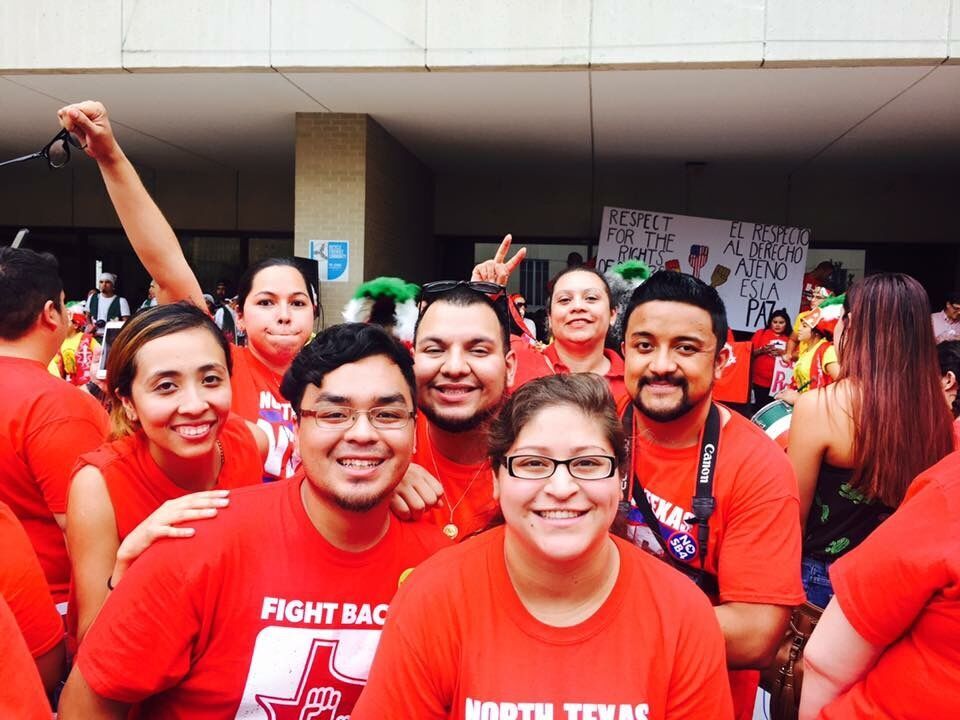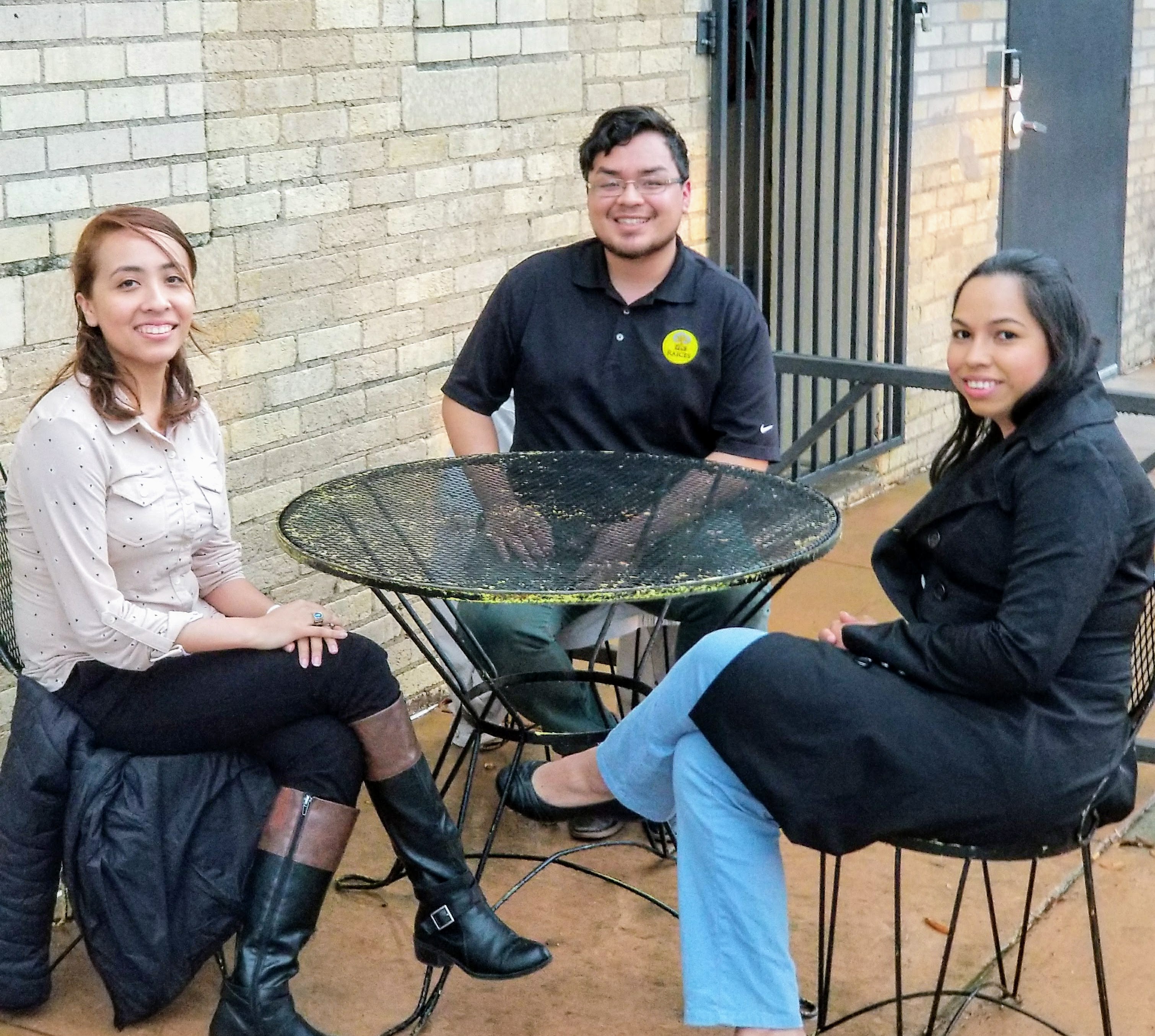With the future still uncertain for undocumented immigrants living in the U.S., many Dreamers feel neglected, or worse, like pawns in an ongoing game of political brinkmanship. Fueled by that uncertainty, and by a frustrating congressional see-saw on the issue of immigration, young immigrants and activists in North Texas are pushing harder for concrete legislation. Something more than the renewal of the Deferred Action for Childhood Arrivals program that allows undocumented immigrants brought to the country as children to remain here provisionally.
Many of them advocate with the North Texas Dream Team, a youth-led nonprofit focused on helping immigrants in the Dallas area, renewing DACA applications and offering support in a number of ways.
Edwin Romero, an organizer with the Dream Team, grows emotional as he recalls the first time he was detained. In 2010, after attending a college student government conference in Corpus Christi, Romero was detained at the airport and held by immigration authorities for 17 days, realizing for the first time what it meant to be living in the U.S. as an undocumented immigrant. He was later released and allowed to remain free after the case was closed in 2011.
Last year, Romero was detained again after he was arrested for an outstanding traffic warrant. Coming during a nationwide immigration crackdown, his arrest became a rallying point for local activists, outraged that Romero’s DACA protection hadn’t kept him from being held by immigration authorities. Janet Martinez, now the secretary of the North Texas Dream Team, was among those who helped arrange for Romero’s release. And Sandra Avalos, another activist, was inspired by stories like Romero’s to join the organization.
I sat down with Romero, Martinez, and Avalos last week to discuss their thoughts on the future of the Dreamers, and the work the North Texas Dream Team is doing here.
How do you feel about what’s happening with DACA?
Edwin Romero: A mixture of so many emotions. Firstly, I’m grateful for DACA…but it’s only a temporary solution. It’s frustrating being played around with the government as if we’re not actual human beings. Our lives and our futures—we don’t know where we’re going to be. We’re tired of living with uncertainty, which is why we are fighting for a permanent solution.
Sandra Avalos: Frustrated, because it’s a battle that has been going on for years. I have a daughter who solely depends on me, and if I don’t have guarantees in keeping my job…How am I going to pay for my house, my car, for basic needs? It frustrates me that something needs to be done and it should have been done years ago.
What work is the North Texas Dream Team doing now?
Romero: Having done work since before 2012 (when DACA was put in place), the team has advocated and worked hard to reach this point. They planned the Dream Act rally earlier this month to make sure the community and elected officials know DACA is not enough, and we need a permanent resolution. Not something which will criminalize our parents. We don’t want citizenship in exchange for our parents being deported. It’s as simple as that.
Janet Martinez: We always keep an open space for Dreamers to express how they feel about their situation. As a team, we are all very supportive of how each of us feels, even if there are differing opinions on legislation. We also do DACA workshops. We (pick a day), get a venue, print out applications to fill out, and go through a process of screening to make (young undocumented immigrants) are eligible. We even go out to fundraise.
Avalos: The team pushes an educational part as well: know your rights. Also, we partner with other organizations that have the ability to have volunteer attorneys who help. Especially when laws like SB4 come into effect and led to a lot of deportations, separating families. It’s important to know these people are our brothers and sisters, our neighbors.

How do you feel about the way Dreamers are portrayed (by politicians and the media)?
Romero: People have the stereotype of Dreamers as exemplary students who graduated or are in college. For me, because of personal and financial reasons, I haven’t been able to finish my bachelor’s degree. It’s not because I decided to drop out. People have different lives and circumstances. I might be a school dropout, not a straight A student, or not making this amount of mone. It doesn’t mean I don’t deserve to be here. This country is not my own, but this country is still my home. I grew up here and contribute in so many other ways.
Martinez: It’s like we have a checklist. ‘Valedictorian? Check, you’re a Dreamer. Perfect GPA? Check, you’re a Dreamer. Are you the first to go to college? Oh, you must be a Dreamer and got a scholarship.’ I didn’t get a scholarship. Don’t stereotype everyone as a Dreamer who gets money thrown at them.
Avalos: The accent. In high school I would tell people I’m from Mexico and they’re like ‘You don’t have an accent!’ Brought over at a young age, you tend to lose the accent and sometimes even the language. Also, Dreamers are not just Mexicans. They are Muslims, Asians, and Indians. It’s important people dig in and realize that.
What are the team’s plans for the future?
Martinez: Our executive board has a new perspective…More women, all colored. A big part I want to contribute is by reaching out to everyone, every single community. Whether you’re Asian, Muslim, whatever it is, I want to hear their stories and make sure they understand who we are and where we come from.
Romero: If I could choose one word for my goal, it would be: empower. I feel empowered by NTDT. If we unite, we have more power.
Martinez: I want us to spread in the North Texas area, so we are able to educate everyone about who we are as immigrants. Not criminals, rapists, drug dealers, none of that. We are humans. This is what everyone here has to realize. I feel like Texas is an example to the rest of the nation.
Avalos: I want to share more stories, like Edwin’s, to show the community: this is what your power is. You can pick up that phone and (call an official). At that point, you know there is nothing you can’t do. When you do the rallies outside, when you’re writing letters, when you make those phone calls…It makes a difference.






